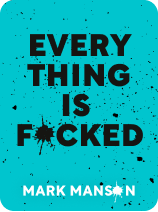

This article is an excerpt from the Shortform book guide to "Everything Is F*cked" by Mark Manson. Shortform has the world's best summaries and analyses of books you should be reading.
Like this article? Sign up for a free trial here.
Does hope always seem beyond your reach? Is there something What strategies can help when you’re feeling hopeless?
In his book Everything Is F*cked, Mark Manson explains what to do if you’re struggling to find hope and wondering how to cope with negative emotions and beliefs. He argues that feeling hopeless is a common human experience, but learning how to find hope is not impossible.
Keep reading to learn Manson’s strategies for learning how to find hope.
Why Do Some of Us Feel Hopeless?
In self-help author Mark Manson’s book Everything Is F*cked, he explains that people without hope may try to numb the pain of existence by suppressing all their emotions, languishing at a baseline of dull pain. He asks the following question: If we all devalue ourselves to cope with the pain of existence, how can we ever learn how to find hope?
Many lucky people grow out of their “hopeless” phase in adolescence, according to Manson. As children, they find that by following the rules that their parents set, they can earn praise and avoid punishment—in other words, they can reliably do unpleasant things that bring about a better future for themselves, attaining hope.
However, if a child’s parents fail to give their child consistent rules (either by neglecting and abusing them or by spoiling and rewarding them no matter what they do), the child internalizes the idea that nothing they do has predictable consequences. Without the faith that they can create a better future through their actions, they can’t hope. If this happens, the child must learn how to find hope as an adult, which is more difficult.
| How to Teach Children Through Discipline How can parents provide their children with the kind of clear discipline that allows them to learn how to hope so they don’t have to struggle to find that hope as adults? The authors of No-Drama Discipline argue that the most important guideline is to put your children in a mindset that’s receptive to learning while disciplining them. This aligns with Manson’s perspective, as he claims that the purpose of discipline is to help children learn the predictable rules that allow them to hope. The authors of No-Drama Discipline argue that punishments like time-outs and spanking are ineffective forms of discipline because they make children feel threatened and defensive. This activates more emotional parts of the brain that prevent children from learning how they should behave and why. Instead, parents should empathize with their children and talk to them as people, setting clear boundaries and explaining the rationale behind those boundaries. Once a child learns these predictable boundaries and gains a sense of hope, they’ll start to feel healthy guilt and regret over their bad behavior and will naturally strive to do better. Organizing your own emotions in this way is also the primary way to teach yourself how to find hope, as we’ll see next. |
How, specifically, can adults learn how to find hope if they feel hopeless? We’ll discuss this next.
How to Find Hope: Manson’s Strategies
Manson offers two main strategies for learning how to find hope. First, find hope by changing your beliefs about yourself. Reflect on your past experiences and find a way to reinterpret them so you believe that you do have the ability to attain something of value rather than believing that you’re inherently worthless and powerless.
| You’re Already Valuable Arguably, changing your beliefs about yourself doesn’t require reflecting on the past. The authors of The Courage to Be Disliked contend that generally, reflecting on your past is a distraction that prevents you from taking action in the present. Instead, they recommend living as if the past doesn’t exist. Additionally, it may help you feel valued and empowered to know that the authors of The Courage to Be Disliked argue that every human helps others by simply existing. Many people find human life to be inherently valuable, and coexisting with others makes these individuals happy. Everyone else is actively helping those people to be happy just by being alive. In short, feeling valuable is an extremely attainable goal because being alive is something valuable. |

———End of Preview———
Like what you just read? Read the rest of the world's best book summary and analysis of Mark Manson's "Everything Is F*cked" at Shortform.
Here's what you'll find in our full Everything Is F*cked summary:
- How the hopelessness epidemic is affecting society
- Why you must abandon hope in order to live a fulfilling life
- How to practice a life without hope and instead, find meaning






